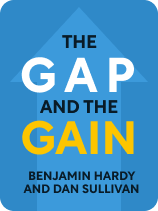

This article is an excerpt from the Shortform book guide to "The Gap and The Gain" by Benjamin Hardy and Dan Sullivan. Shortform has the world's best summaries and analyses of books you should be reading.
Like this article? Sign up for a free trial here .
What’s Gap-thinking? How can you get out of it and stay out of it? What does it have to do with self-accountability?
Gap-thinking is comparing who you are now to who you want to be. According to the book The Gap and the Gain, this is a recipe for unhappiness. Authors Dan Sullivan and Benjamin Hardy argue that you should shift to Gain-thinking, which is comparing who you are now to who you used to be. They believe that holding yourself accountable is a key to getting out of—and staying out of—Gap-thinking.
Keep reading to learn how powerful holding yourself accountable can be when it comes to your success and happiness.
Holding Yourself Accountable
The authors recommend holding yourself accountable as a means of avoiding Gap-thinking. To get yourself out of Gap-thinking, you must first be self-aware enough to realize that you are there in the first place. Call yourself out as soon as you realize you’re falling into Gap-thinking. Don’t let yourself stay in this mindset for longer than five minutes. Once your time is up, spend the next few minutes mentally transforming the experience into a gain by contemplating what you’ve learned from it. Then, move on.
| How to Move On Psychologist Tara Brach suggests using the meditative practice of Radical Acceptance to “move on” from thinking about negative past experiences. There are two equally necessary steps to this practice: The first is self-awareness. As the authors suggest here, self-awareness is the first step in healing from the past. You should observe your thoughts and emotions rather than trying to avoid them or block them out. The second step is to have empathy for yourself as you observe these thoughts and feelings. Reacting with judgment puts you in the Gap because you’re fixated on how you don’t measure up to your ideal self. Reacting with compassion expands your ability to think positively about the event, which helps to transform it into a Gain. |
Hardy and Sullivan also suggest explaining to those around you what Gap- and Gain-thinking are and then encouraging them to call you out for Gap-thinking. Find someone to be your success partner. Tell this person about the gains you’ve made today and the gains you want to make tomorrow. Reporting your progress to someone else is an effective way to improve and accelerate your performance.
(Shortform note: For accountability to work, you must create significant consequences for your behaviors that don’t align with your goals. These consequences have to be just as (if not more) potent than the benefits you gain from these behaviors. This is why success partners are effective—our desire for respect and approval from other people is a powerful motivator that usually outweighs the benefits of giving in to problematic behaviors.)

———End of Preview———
Like what you just read? Read the rest of the world's best book summary and analysis of Benjamin Hardy and Dan Sullivan's "The Gap and The Gain" at Shortform .
Here's what you'll find in our full The Gap and The Gain summary :
- Why you must compare who you are now to who you used to be
- Why you should focus on your past rather than your future
- How Gain-Thinking can improve your happiness, self-esteem, and physical health






